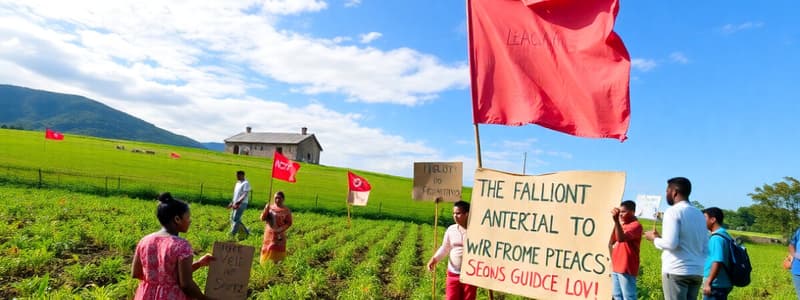Podcast
Questions and Answers
The wild boar was introduced to Neuquén after the Conquest of the Desert.
The wild boar was introduced to Neuquén after the Conquest of the Desert.
True (A)
The Lof Kinxikew Mapuche community is concerned about the preservation of their menucos, as losing them would not impact their food sources.
The Lof Kinxikew Mapuche community is concerned about the preservation of their menucos, as losing them would not impact their food sources.
False (B)
The Yriapú Guaraní community is involved in initiatives to enhance deforestation instead of preventing it.
The Yriapú Guaraní community is involved in initiatives to enhance deforestation instead of preventing it.
False (B)
Socio-territorial movements in Brazil have remained inactive during the COVID-19 pandemic.
Socio-territorial movements in Brazil have remained inactive during the COVID-19 pandemic.
Signup and view all the answers
Agrarian socio-territorial movements in Latin America are solely focused on economic gains and ignore environmental issues.
Agrarian socio-territorial movements in Latin America are solely focused on economic gains and ignore environmental issues.
Signup and view all the answers
Brazil has been the greatest consumer of agrotoxins in the world since 2008.
Brazil has been the greatest consumer of agrotoxins in the world since 2008.
Signup and view all the answers
70% of fresh foods consumed in Brazil are free from pesticide contamination.
70% of fresh foods consumed in Brazil are free from pesticide contamination.
Signup and view all the answers
The Permanent Campaign against Agrotoxins and for Life aims to advance Legislative Bill 6299.
The Permanent Campaign against Agrotoxins and for Life aims to advance Legislative Bill 6299.
Signup and view all the answers
Local mobilizations related to agricultural conflicts have been documented in Minas Gerais since 2009.
Local mobilizations related to agricultural conflicts have been documented in Minas Gerais since 2009.
Signup and view all the answers
MST filed a suit that successfully led to the suspension of agrotoxins in a region of Brazil.
MST filed a suit that successfully led to the suspension of agrotoxins in a region of Brazil.
Signup and view all the answers
Study Notes
Latin American Socio-Territorial Movements
- Indigenous, peasant, and family farm communities organize to combat environmentally destructive practices in Argentina and Brazil.
- Activities include protest, reforestation, agroecological production & commercialization, and judicial action.
- Shared goal is the defence and development of communities' territories.
Argentina
-
Mbya Guaraní of Perutí Community
- Reforestation initiatives
- Organizational initiatives
-
Lof Kinxikew Mapuche Community
- Key issue is the loss of Menucos (wetlands).
- Communities reliant on Menucos for fauna, flora, and medicinal plants.
Brazil
-
Movimento dos Trabalhadores Rurais Sem Terra (MST)
- Brazil's largest social movement for land reform.
- Central role in agroecological production.
-
Movimento dos Trabalhadores Sem-Teto (MTST)
- Focus on urban issues.
Key Issues in Brazil
-
Agrotoxins
- Brazil is the top consumer of agrotoxins (pesticides).
- Demonstrations against agrotoxins, especially against the "Package of Poison" (Bill 6299).
- MST actively promotes healthy food production without agrotoxins.
-
Deforestation
- Communities are resisting deforestation linked to agribusiness and mining.
- MST's “Plant Trees, Produce Healthy Foods” plan aims to plant 100 million saplings in 10 years.
-
Mining
- Dam ruptures by Vale and Samarco caused major environmental damage.
- Protests against companies responsible for ruptures.
- Conflicts with mining projects on community lands, including land concessions to foreign companies.
Agroecology
- Brazil has a diverse network of agroecological initiatives.
- Campaigns and events promoting agroecology take place throughout the year.
- Aim to address food security and overcome hunger using agroecological methods.
Challenges
- Right-wing governments have presented challenges to socio-territorial movements' goals.
- Brazilian government was hostile to social and environmental justice.
- Argentine government was unable to fully implement redistributive policies and limit extractivist activities.
Final Observations
- The environmental question is increasingly central to the agendas of socio-territorial movements.
- These movements are addressing the intersections of sustainable agriculture and climate change.
- Their survival, living conditions and aspirations for equitable development in the countryside are at stake.
Studying That Suits You
Use AI to generate personalized quizzes and flashcards to suit your learning preferences.
Description
Explore the diverse socio-territorial movements in Latin America, focusing on the Indigenous, peasant, and family farm communities in Argentina and Brazil. Learn about their collective efforts in protesting environmentally harmful practices, reforestation initiatives, and agroecological production, all aiming to protect and develop their territories.



